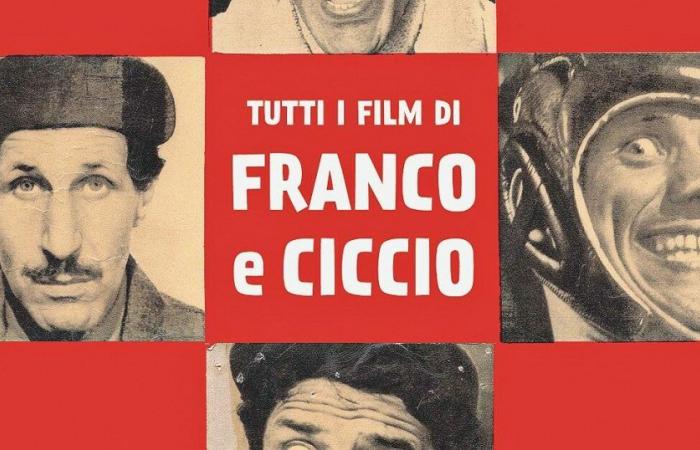Francociccisti, or Francongrassiani, from all over the country, raise your antennas. To the Cinema Ritrovato of Bolognabetween a restored one Marlene Dietrich sold in the lgbtq way and aAlice Rohrwacher who mocks Pirandello (“I decided to make a silent film since I discovered that Pirandello hated silent films”), here are two very Sicilian spies “who came from the semifreddo” re-emerging between the pages of a work that is physically, and not only, omnia.
All Franco and Ciccio films it’s the book of Marco Giusti (Bloodbuster editions) which closes doors, glimmers, cracks that remained open on the famous Sicilian comic duo who established themselves commercially in Italian theaters in the sixties and then established themselves as the iconography of a carefree and mass popular memory. A bit like the usual problem that laughter at the cinema in Italy, and not only, has had with the concept of culture.
An immediate fact to open (page 67 of the book): from when they began to appear in their first film together (Appuntamento ad Ischia, 1960) until around 1973 when the first separation came (in 1984 they returned in Kaos dei Taviani) they shot 110 films for a total revenue of 80 billion. An enormity. Especially if you think about the very low production costs, led by those of the far-sighted Fida. Yet, despite the very human and universal apprenticeship in the misery of street artists with literally a hole in their ass (there is the anecdote of Ciccio with his woolen knickers who, on a down-at-heel freezing tour in Abruzzo at the end of the fifties, did not will take them away for days), the authentic sincere popularity among people and especially among children achieved by making people laughFranco and Ciccio remain in the archives of memory also as those two actors who attempted to gain credibility in the high world of Italian cinema, even in the same genre of comedy but like Monicelli or Risi, without ever having real success.
Let’s remember it again for those who have forgotten the days spent especially on TV seeing them again in the eighties and nineties (the writer survived a chickenpox while laughing out loud at I due sansculotti) that Franco and Ciccio’s fortune was precisely that of parody the so-called high cinema, or at least the titles that are strong in the box office and then come within literally an inch of takings. Two mafiosi against Goldginger, 00-2 top secret agents, The good, the bad and the idiot, An eyesore, Seduced and ripped off are just some of the hundreds of parodic titles compared to the great spy story model references, spaghetti westerns or , sacrilege, even high comedy (in turn very profitable in takings) towards which the two comedians will finally seek, starting from the seventies, an acting foothold for that entirely psychological individual worry of socio-cultural revenge (“the filter of the intellect” , Franco explained in an interview). Moreover, Giusti points this out several times.
Film critics – primarily “those from the North” – tore apart the films with Franco and Ciccio for years. “Their stupid faces, their unpleasant facial expressions, their stupid jokes are a hit”. “The most vile nothings of a cinematic undergrowth as offensive as it is full of ill-gotten millions”. These are just some of the firsts that Giusti sifts through newspapers, magazines and documents of the time. While their films, often 4 or 5 a year, ended up on the second and third viewing circuits, remaining there for up to a decade, Franchi and Ingrassia were culturally massacred. Right? Wrong? The story, the episodes, the disagreements between the two testify that they needed the role, the part, the space as “quality” protagonists. And just think, still fresh from the Pinocchio television of Comencini, definitively risen to playful faces of popular entertainment, Ciccio is the first to “betray” by acting for Florestano Vancini in Violence: fifth estate (forgotten by most), while Franco seeks the path to a solo musical debut (unheard by most).
Of course they will come The exorcise for Ingrassia e Last tango in Zagarolo for Franchi, alone on stage still in the parodic wake with assured success, but it is the alchemy of the duo that comes from the dust of the street that shades sad and melancholic as in a Zavattinian subject. In this regard: to understand well both the vocation of Franchi and Ingrassia as children, the balance of work in the golden formula in the room (recited like a mantra Lucio Fulci, Lucio Fulci), and above all the exact chronology of the numerous separations /reconciliation of the two, instead of browsing Wikipedia on your smartphone, buy Giusti’s book and you will be satisfied.






